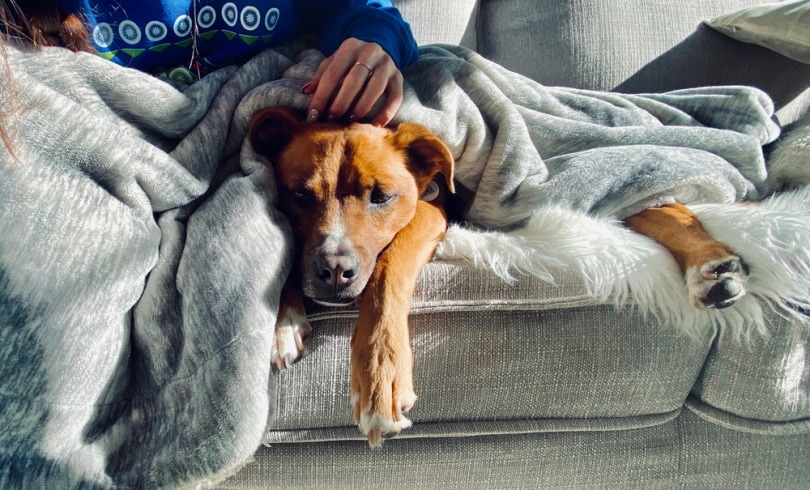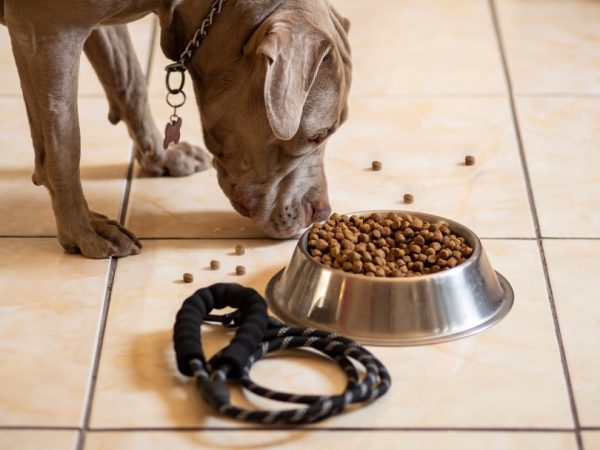Most dogs do like blankets. In fact, they seem to love them! They appreciate being wrapped in a warm blanket or being cuddled up close with their owner under one, and many dogs seem to thrive on having a soft blanket nearby. So, does this mean that all dogs like blankets?
Blanket usage can vary from dog to dog, but most enjoy having one placed over them while they sleep. For some dogs, it is simply a way to keep them warm. For others, it may be seen as a toy or comfort item. Regardless of the reason, blanket usage among dogs is common and usually enjoyed.
There’s no denying that a blanket can be a comforting presence for dogs, and if you want to bring an extra level of coziness to your pup’s life, it’s worth giving a blanket a try!

Why Do Dogs Need Security?
Dogs have a natural propensity to form attachments to specific people, so they crave security. A dog’s blanket is incredibly comforting, which helps since many families have hectic routines. Changes in your everyday activities, school, and work can give your pet a sense of instability. Although these activities are important to you, they can be stressful for your pet.
A dog without proper security can become anxious or destructive. Dogs need to feel safe and secure to feel calm and content in their environment. Some common ways to provide security for dogs include having a special blanket, a designated place to sleep, chew toys and bones, and arranging regular one-on-one times with your dog.

Do Dogs Suffer From Object Impermanence?
Dogs suffer from reduced object permanence, which means they are more likely to assume that objects exist in a constant state of flux. This means that your dog may believe that no object is permanent, and therefore, they will never be able to rely on anything in their environment continuing to exist once it is out of sight.
This can be particularly troublesome for dogs because they form strong emotional attachments to people and certain objects, such as toys or bones. When these objects are taken away or destroyed, the dog may experience significant psychological distress.
How Does a Blanket Help Dogs With Stress?
Dogs can feel stressed for various reasons, such as changes in their environment, loud noises, or being around other animals. One way to help them calm down is by using a blanket. Over time, the fabric of a blanket may give off a familiar scent that dogs find calming. Additionally, the weight of a blanket can be comforting to dogs.
Dogs are incredibly social creatures, so they rely on their human companions to help them cope with stress. Humans can help dogs deal with stress outside the home by providing them with familiar objects from home. Dogs who have a familiar item from home around them, such as a blanket, feel more relaxed and comfortable in new environments. This is likely because the blanket reminds the dog of their home environment and the people they love.

Blankets & the Nesting Instinct
Dogs evolved from wolves and still maintain many of the behaviors and characteristics of their wild ancestors. One such behavior is the nesting instinct, which prompts dogs to seek sheltered places to rest and keep their young safe. This instinct can be seen in domestic dogs when they relax under furniture, inside cars, or in other small, enclosed spaces. Dogs are instinctively drawn to create nests as a way to feel secure.
In the wild, dogs use their dens to give birth, raise their puppies, and take refuge from predators. Domestic dogs still have this instinct and often seek blankets, pillows, or other soft objects to create a makeshift nest. This nesting instinct can be especially strong in pregnant dogs, who may seek a protected spot to give birth.
Keeping Warm
One way to keep your dog warm is to provide them with a blanket. Blankets insulate your dog’s body and retain their body heat. Make sure that you keep your dog’s sleeping area and house warm, especially during the colder months—you can even provide your dog with a sweater or coat if necessary.
There are a few things to consider when keeping your dog warm during winter. One is the type of blanket you use. Several types are available, but a heated blanket is the best type for keeping your dog warm. Fleece blankets are also a great option. Made of a soft, synthetic fabric that retains heat well, they are also relatively lightweight and easy to transport, making them ideal for taking with you on trips.

Keeping Your Dog Calm During a Thunderstorm
Using a blanket can calm a dog during a thunderstorm. The blanket provides a sense of security and can block out some of the sounds of thunder. Additionally, providing water and a quiet place for the dog to hide can reduce anxiety. Weighted blankets are covered in fabric and filled with pellets or beads, making them heavier than a traditional blanket.
The extra weight is said to provide a sense of calm and security, especially for pups with anxiety disorders. If you use a weighted blanket, make sure it is designed specifically for pets. Human-weighted blankets are unsuitable since they are too heavy and may induce panic or cause suffocation.
Feeling At Home While Traveling
Dog owners bring a blanket for their dogs when they travel for various reasons. For example, some dogs feel more at home when their belongings surround them, and a blanket is often seen as comforting. Additionally, some people find that using a blanket helps their dog to fall asleep more easily when they are in an unfamiliar place.
Finally, blankets can also provide warmth for your dog on a cold flight. Overall, a special blanket can provide a sense of security and comfort for your dog while traveling.

Conclusion
In conclusion, blankets can be very beneficial for dogs. They can provide comfort, warmth, and stress relief and can make them happier and healthier. If you are looking for a way to show your dog some extra love, consider buying them a blanket. Be sure to choose one that is the right size and is made from a warm, comfortable material.
See also:
- 10 DIY Dog Toys to Keep Your Pup Busy (With Pictures): Vet Approved Ideas
- Do Dogs Like Kisses? Communication, Signs & Alternatives
Featured Image Credit: Gladskikh Tatiana, Shutterstock























